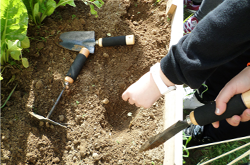This one-day program involves participation in a series of activities theoretically and practically directed. It is organized in such a way as to support the understanding of environmental concepts and issues while hooking the students into a fascinating educational adventure.
- Mission
The students receive their mission by other students complaining about the tasteless and odorless vegetables they eat and thus the students decide to create a vegetable garden at the environmental centre. The student’s mission is to help with the caring of the vegetable garden found at the centre and to expand the vegetable garden of CYCERE’s by developing their own section within the vegetable garden.
2. Research, experiment and discover
The students are asked through their research to collaborate in experiential activities and experiments as to give an answer to questions such as: What vegetable species should we plant in our garden? What soil is more appropriate for planting? Why is it important for vegetation to be found on the ground? How is a plant developed? What are the plant’s development stages?
- Planting and caring of the garden
The students are asked to think about the caring required by a vegetable garden (watering, digging, removal of weeds, fighting plant diseases) and to take care of CYCERE’s garden. In addition, they are asked to decide through a debate if they will use some chemical substances for fighting the plant diseases (conventional agriculture) or if they will avoid the use of such substances (organic agriculture).
- Reflection
The students return back to the Biology lab where the tree of veggie-wishes is presented. Each student receives a vegetable-shaped paper and is asked to write down thoughts, impressions and suggestions regarding the development of a vegetable garden. Afterwards, each group presents their thought and hangs the paper on the tree of veggie-wishes. After finishing this activity, the students participate in a quiz.
- Action
Before returning back to school, the students are asked to think whether they would like to develop a vegetable garden at their school / house and to justify their opinion.
Through this program, the cultivation of research skills through in situs observation, the conceptual comprehension and the environmental awareness of the students regarding the development and conservation of a vegetable garden are promoted through a holistic approach and experiential learning. The methodological approaches implemented are intertwined with the principles and the philosophy of Environmental Education and the Education for Sustainability also promoting group work and collaboration.
 Κυπριακό Κέντρο Περιβαλλοντικής Έρευνας & Εκπαίδευσης – Κυκπεε
Κυπριακό Κέντρο Περιβαλλοντικής Έρευνας & Εκπαίδευσης – Κυκπεε




